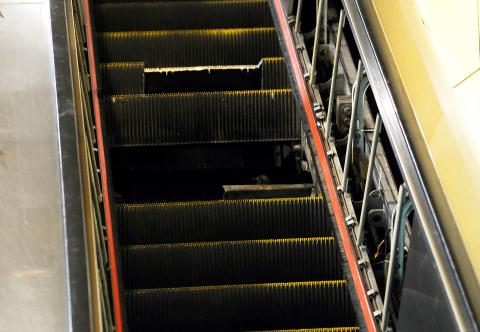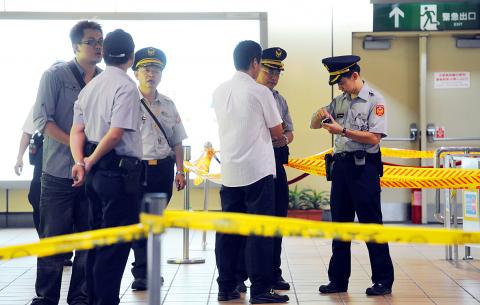The deputy station director at Taipei’s Dingxi MRT Station died yesterday after falling into a 1.5m-deep hole on an escalator caused by equipment being used for maintenance work, sparking concerns about safety measures at Taipei Rapid Transit Corp (TRTC).
Kuo Cheng-chieh (郭政杰), 34, fell into the hole created by a 3m-long anti-flood board that hit the escalator at exit 1 of the station after he dropped it while trying to carry it up the escalator.

Photo: Lo Pei-der, Taipei Times
TRTC said Kuo fell into the hole at about 2:40am, but was not discovered until 5am when the station’s security guard found him.

Photo: Lo Pei-der, Taipei Times
It took firefighters about three hours to get Kuo out of the hole, before rushing him to Cardinal Tien Hospital in Yonghe, New Taipei City (新北市).
Kuo was later pronounced dead.
The hospital said the cause of death was blood loss from an injury to his femoral artery.
It was the first deadly accident involving TRTC staff using maintenance equipment.
TRTC deputy chairman Shen Chih-chang (沈志藏) said Kuo was carrying the anti-flood board to test anti-flood equipment at the station, work that should have been done by two employees.
“We don’t know why Kuo did not wait for the night-shift security guard and decided to work alone ... TRTC will cooperate with an investigation launched by prosecutors,” he said.
TRTC also failed to explain why it took the security guard such a long time to find Kuo.
Taipei Mayor Hau Lung-bin (郝龍斌) paid a visit to Kuo’s family at the hospital yesterday afternoon and instructed TRTC to help the family with Kuo’s funeral service.
“Accidents are the last thing we want to see and TRTC will take responsibility, give proper -compensation to Mr Kuo’s family and examine its safety measures,” Hau said.
In response to concerns about the delayed rescue effort, Shen said each MRT station has one staff member on duty after services stop at about midnight, while a security guard patrols the station every hour.
He declined to comment on whether the accident could have been prevented if there had been more than one staff member on duty at the station, but said TRTC would examine its procedures.
Taipei City’s Department of Labor Affairs said it would look into possible safety flaws at TRTC, while police and prosecutors in New Taipei City have launched an investigation into the case.

MISINFORMATION: The generated content tends to adopt China’s official stance, such as ‘Taiwan is currently governed by the Chinese central government,’ the NSB said Five China-developed artificial intelligence (AI) language models exhibit cybersecurity risks and content biases, an inspection conducted by the National Security Bureau (NSB) showed. The five AI tools are: DeepSeek, Doubao (豆包), Yiyan (文心一言), Tongyi (通義千問) and Yuanbao (騰訊元寶), the bureau said, advising people to remain vigilant to protect personal data privacy and corporate business secrets. The NSB said it, in accordance with the National Intelligence Services Act (國家情報工作法), has reviewed international cybersecurity reports and intelligence, and coordinated with the Ministry of Justice Investigation Bureau and the National Police Agency’s Criminal Investigation Bureau to conduct an inspection of China-made AI language

BOOST IN CONFIDENCE: The sale sends a clear message of support for Taiwan and dispels rumors that US President Donald Trump ‘sold out’ the nation, an expert said The US government on Thursday announced a possible sale to Taiwan of fighter jet parts, which was estimated to cost about US$330 million, in a move that an expert said “sends a clear message of support for Taiwan” amid fears that Washington might be wavering in its attitude toward Taipei. It was the first announcement of an arms sale to Taiwan since US President Donald Trump returned to the White House earlier this year. The proposed package includes non-standard components, spare and repair parts, consumables and accessories, as well repair and return support for the F-16, C-130 and Indigenous Defense Fighter aircraft,

CHECKING BOUNDARIES: China wants to disrupt solidarity among democracies and test their red lines, but it is instead pushing nations to become more united, an expert said The US Department of State on Friday expressed deep concern over a Chinese public security agency’s investigation into Legislator Puma Shen (沈伯洋) for “secession.” “China’s actions threaten free speech and erode norms that have underpinned the cross-strait ‘status quo’ for decades,” a US Department of State spokesperson said. The Chongqing Municipal Public Security Bureau late last month listed Shen as “wanted” and launched an investigation into alleged “secession-related” criminal activities, including his founding of the Kuma Academy, a civil defense organization that prepares people for an invasion by China. The spokesperson said that the US was “deeply concerned” about the bureau investigating Shen

‘TROUBLEMAKER’: Most countries believe that it is China — rather than Taiwan — that is undermining regional peace and stability with its coercive tactics, the president said China should restrain itself and refrain from being a troublemaker that sabotages peace and stability in the Indo-Pacific region, President William Lai (賴清德) said yesterday. Lai made the remarks after China Coast Guard vessels sailed into disputed waters off the Senkaku Islands — known as the Diaoyutai Islands (釣魚台) in Taiwan — following a remark Japanese Prime Minister Sanae Takaichi made regarding Taiwan. Takaichi during a parliamentary session on Nov. 7 said that a “Taiwan contingency” involving a Chinese naval blockade could qualify as a “survival-threatening situation” for Japan, and trigger Tokyo’s deployment of its military for defense. Asked about the escalating tensions